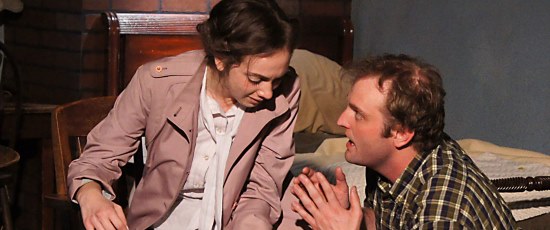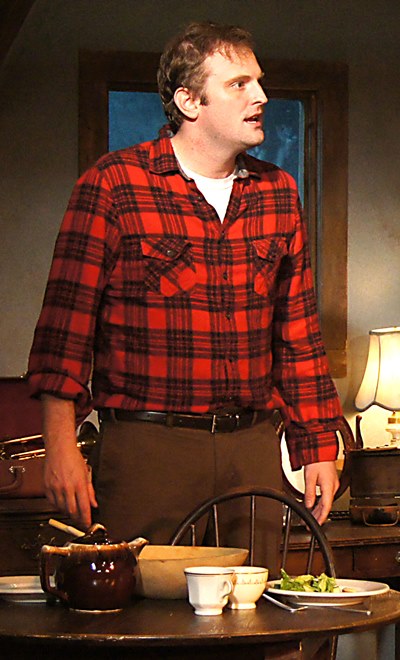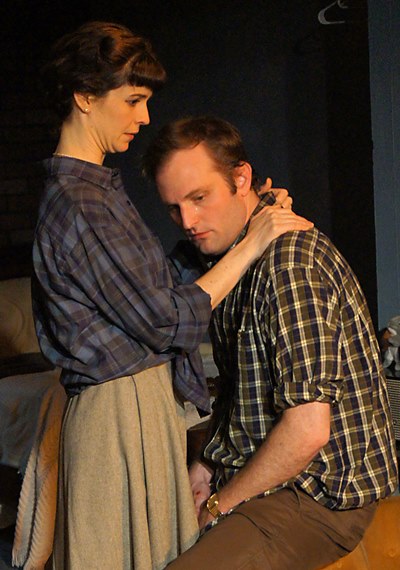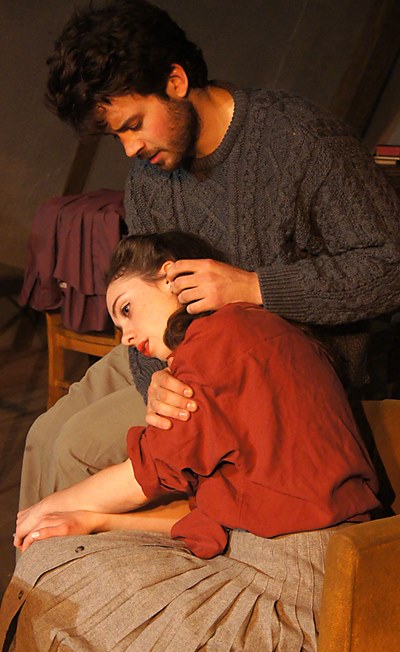‘Look Back in Anger’ at Redtwist: Bitterness nurtured as mode of life in post-war England
 Review: “Look Back in Anger” by John Osborne, at Redtwist Theatre extended through June 28. ★★★★
Review: “Look Back in Anger” by John Osborne, at Redtwist Theatre extended through June 28. ★★★★
By Lawrence B. Johnson
Jimmy Porter is a bright but very angry young working-class Englishman who has grown to adulthood in the decade following the end of World War II. While he has married somewhat above his social grade, his life is going nowhere. In John Osborne’s searing 1956 play “Look Back in Anger,” Jimmy consecrates his sharp wit and tireless energy to a seething, circular rant.
That’s what Jimmy does: He seethes at society’s old order and snipes at his wife and best friend. His tirades are as masterful and fascinating as they are bitter and destructive, and in Redtwist Theatre’s electric production directed by Jonathan Berry, Joseph Wiens lends Jimmy all the brilliance and sadness of a man in existential warp, spiritually homeless in a world that has lost its meaning.
 As if taking up the banner of despair from French existential playwrights like Jean-Paul Sartre, Jean Anouilh and Albert Camus, Osborne’s bleakly comic drama paints life as an absurdity bordering on hopelessness.
As if taking up the banner of despair from French existential playwrights like Jean-Paul Sartre, Jean Anouilh and Albert Camus, Osborne’s bleakly comic drama paints life as an absurdity bordering on hopelessness.
Jimmy and his wife of four years, Alison (imbued with wan luminosity by Baize Buzan), occupy a humble flat (rendered palpably tired by designer Joe Schermoly) — across the hall from his buddy Cliff. In this casual ménage à trois, Cliff (stalwart and resilient in the person of Japhet Balaban) and Alison share a deep affection that has a physical dimension just short of sex, and Jimmy subjects both of them to his brutally cutting jibes.
In Wiens’ almost maniacal delivery, Jimmy’s wickedly clever effusions – saber-toothed stream-of-consciousness without the restraint of socialization – leave the listener aghast and agog. Nor are these speeches smart little aphorisms, but rather lengthy diatribes that Wiens tosses off with a sort of perverse panache.
Why do wife and pal put up with it? Well, Cliff because he understands that’s just who Jimmy is. And besides, in better moments, the two men can instantly break into a vaudeville song-and-dance routine. They are more like brothers than mere friends. As for poor Alison, who spends most of her time at an ironing board, the reason for hanging on is a bit less clear, even for her. She endures impassively, then once in a while this odd couple retreat into alter identities, as squirrel and bear, playing a childish game in childish voices to re-establish, however briefly, the affection they once shared.
 Enter Helena, an actress and old friend of Alison whom Jimmy openly despises. Why he might resent this woman becomes quickly evident. Like an interloper from the real world, Helena (the sober, fiercely rational Lucy Carapetyan) will have none of Jimmy’s gleeful rudeness. When he spouts off at her, or for that matter at anyone, Helena rebukes him sharply. When he presses his nastiness, she threatens to slap his face – whereupon he informs her that he never learned playground chivalry and that if she lays a hand on him, he will lay her out.
Enter Helena, an actress and old friend of Alison whom Jimmy openly despises. Why he might resent this woman becomes quickly evident. Like an interloper from the real world, Helena (the sober, fiercely rational Lucy Carapetyan) will have none of Jimmy’s gleeful rudeness. When he spouts off at her, or for that matter at anyone, Helena rebukes him sharply. When he presses his nastiness, she threatens to slap his face – whereupon he informs her that he never learned playground chivalry and that if she lays a hand on him, he will lay her out.
But this is not, in a key sense, the real world. Helena is now in the mind loop that is chez Jimmy. And the utterly unimaginable thing happens. Let’s just say Alison, now pregnant, decides to take a time out, an action that happily introduces us to her upper-middle-class father, the retired Colonel Redfern, one-time commander of British forces in India — and the very personification of the outlook, attitude and better class that Jimmy so devoutly loathes.
 The Colonel’s arrival is indeed happy because it brings to the stage Larry Baldacci as that old gentleman, who muses quite sympathetically and touchingly on Jimmy’s hatred for him and the events that led to his daughter’s improbable choice of a husband.
The Colonel’s arrival is indeed happy because it brings to the stage Larry Baldacci as that old gentleman, who muses quite sympathetically and touchingly on Jimmy’s hatred for him and the events that led to his daughter’s improbable choice of a husband.
Let us also observe, in our elliptical mode, that Helena – needing a place to stay – remains under the same roof with Jimmy and Cliff, and the ironing board. It’s also essential to note that Alison returns. Much weathered by her time away, Alison now appears emotionally desperate, and Baize Buzan’s heart-breaking appeal to Jimmy lends credence to what follows.
In form and content, the playwright’s denouement follows closely in the footsteps of his French exemplars. Osborne preserves the dark farce playing out in a parallel world to the one we like to think we inhabit and possibly even understand. What separates him from Sartre is a thin ray of hope.
Related Links:
- John Osborne, the man who changed the face of British theater: Read about the playwright here
- Performance location, dates and times: Details at TheatreinChicago.com
Tags: Baize Buzan, Japhet Balaban, Joe Schermoly, John Osborne, Jonathan Berry, Joseph Wiens, Larry Baldacci, Look Back in Anger, Lucy Carapetyan, Redtwist Theatre

